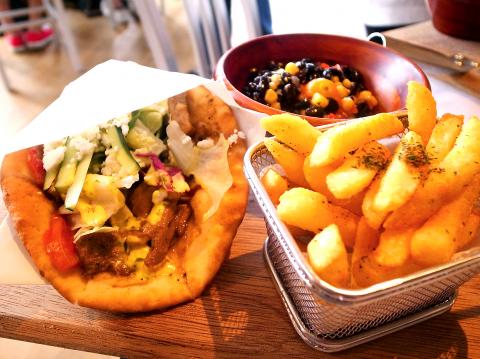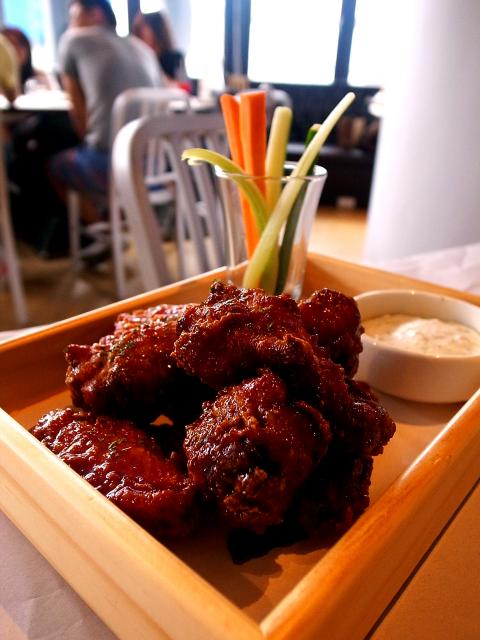Crowded with tourists and teens, Ximending (西門町) doesn’t quickly spring to mind when thinking of places to relax. But with the addition of Amba Taipei (amba意舍), a hotel that opened in February, and its dining outlet Chiba (吃吧), unwinding is on the menu.
A new brand from the Ambassador Hotel Group (國賓飯店集團), Amba Taipei was designed by an international team including Taiwan-born, Bangkok-based interior designer Eugene Yeh (葉裕清), artist Marvin Minto Fang (范姜明道) and Chinese graphic designer Deng Bingbing (鄧兵兵).
The vibe is young and chic. Sunlight streams through a skylight into the lobby, populated by potted trees and flowers, while an array of colorful installation art works vies for attention on the other side of the room. The facilities are playfully and straightforwardly named. Take for example Wenba (問吧) the hotel

Photo: Ho Yi, Taipei Times
counter, which is made out of recycled plastic bottles. In Mandarin the name means “ask.”
This fun-loving spirit continues in Chiba, where the open space is divided not by walls but bookshelves. Toys, games and vintage items such as an old vinyl player are among the knickknacks displayed on the shelves. Books are abundant too and cover a diversity of interests and topics.
The menu offers a compact selection of generously portioned light meals, including soup and salads, at wallet-friendly prices. Service here is more of a casual, do-it-yourself affair. First, diners choose what they want to eat on an order sheet, which is taken to the ring-shaped bar to settle the bill. The dishes are then prepared by a group of young, uniformed cooks, and brought to the table.

Photo: Ho Yi, Taipei Times
Gyros and panini feature predominantly on the menu. The Greek lamb gyro bread (NT$260) is a yummy option made of chewy pita bread filled with tender roast lamb, goat cheese, lettuce, tomato and mint yogurt sauce. The Italian meatball panini (NT$200 for a half serving and NT$320 for full serving), made of mozzarella, basil, beef meatballs and garlic and tomato sauce, is another flavorful sandwich.
For herbivores, the vegetarian gyro bread (NT$240), made of slices of cucumber, yellow and red bell pepper, mozzarella and fresh arugula leaves, is a pleasantly nutty and bitter sandwich.
While the main dishes are mostly pastas, such as spaghetti carbonara with ham (NT$280) and seafood linguine arrabiata (NT$300), appetizers and snacks have a more universal appeal. Items include beer battered fish and chips (NT$180), grilled lamb kebabs with mint yogurt dressing (NT$200) and Korean fried chicken wings (NT$180), which are slightly spicy and sweet and come with a mayonnaise dipping sauce.
The beverage menu contains only nonalcoholic drinks, including freshly squeezed juice (NT$100 to NT$130), teas (NT$120 to NT$150) and coffees (NT$80 to NT$140).
Tipplers should check out the hotel’s lounge bar, Tingba (聽吧), where vinyl records are used as curtains, and jeans and amplifiers are made into decorative art.

In Taiwan there are two economies: the shiny high tech export economy epitomized by Taiwan Semiconductor Manufacturing Co (TSMC, 台積電) and its outsized effect on global supply chains, and the domestic economy, driven by construction and powered by flows of gravel, sand and government contracts. The latter supports the former: we can have an economy without TSMC, but we can’t have one without construction. The labor shortage has heavily impacted public construction in Taiwan. For example, the first phase of the MRT Wanda Line in Taipei, originally slated for next year, has been pushed back to 2027. The government

July 22 to July 28 The Love River’s (愛河) four-decade run as the host of Kaohsiung’s annual dragon boat races came to an abrupt end in 1971 — the once pristine waterway had become too polluted. The 1970 event was infamous for the putrid stench permeating the air, exacerbated by contestants splashing water and sludge onto the shore and even the onlookers. The relocation of the festivities officially marked the “death” of the river, whose condition had rapidly deteriorated during the previous decade. The myriad factories upstream were only partly to blame; as Kaohsiung’s population boomed in the 1960s, all household

Allegations of corruption against three heavyweight politicians from the three major parties are big in the news now. On Wednesday, prosecutors indicted Hsinchu County Commissioner Yang Wen-ke (楊文科) of the Chinese Nationalist Party (KMT), a judgment is expected this week in the case involving Hsinchu Mayor Ann Kao (高虹安) of the Taiwan People’s Party (TPP) and former deputy premier and Taoyuan Mayor Cheng Wen-tsan (鄭文燦) of the Democratic Progressive Party (DPP) is being held incommunicado in prison. Unlike the other two cases, Cheng’s case has generated considerable speculation, rumors, suspicions and conspiracy theories from both the pan-blue and pan-green camps.

Stepping inside Waley Art (水谷藝術) in Taipei’s historic Wanhua District (萬華區) one leaves the motorcycle growl and air-conditioner purr of the street and enters a very different sonic realm. Speakers hiss, machines whir and objects chime from all five floors of the shophouse-turned- contemporary art gallery (including the basement). “It’s a bit of a metaphor, the stacking of gallery floors is like the layering of sounds,” observes Australian conceptual artist Samuel Beilby, whose audio installation HZ & Machinic Paragenesis occupies the ground floor of the gallery space. He’s not wrong. Put ‘em in a Box (我們把它都裝在一個盒子裡), which runs until Aug. 18, invites